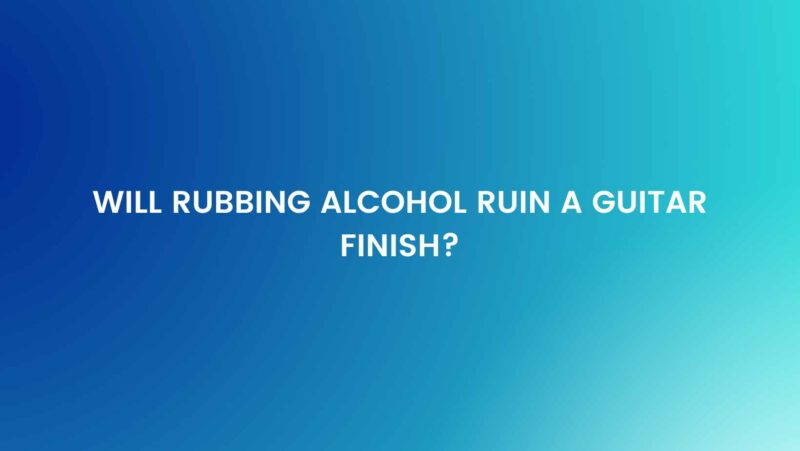Guitars are not only musical instruments but also cherished possessions for many musicians. Proper care and maintenance are essential to preserve their aesthetic appeal and functionality. One common concern among guitar enthusiasts is whether rubbing alcohol can damage a guitar’s finish. In this comprehensive article, we will delve into the potential effects of rubbing alcohol on different guitar finishes and provide guidance on safe cleaning practices.
Understanding Guitar Finishes
Guitar finishes play a crucial role in protecting the wood, enhancing the instrument’s appearance, and influencing its sound. There are several types of guitar finishes, each with its own characteristics and considerations:
- Polyurethane Finish:
- Polyurethane finishes are commonly found on modern guitars.
- They are durable, resistant to moisture, and provide a high-gloss shine.
- Polyurethane finishes are generally less susceptible to damage from cleaning agents.
- Nitrocellulose Finish:
- Nitrocellulose lacquer finishes are often found on vintage and high-end guitars.
- They are known for their thin and breathable nature, allowing the wood to resonate more.
- Nitrocellulose finishes can be more sensitive to chemicals and require gentle care.
- Polyester Finish:
- Polyester finishes are durable and commonly used on budget-friendly guitars.
- They are thick, glossy, and less likely to be affected by cleaning agents.
- Oil and Wax Finishes:
- Some guitars, especially acoustic models, have oil or wax finishes that are more delicate.
- These finishes require specialized care to maintain their luster.
The Impact of Rubbing Alcohol on Guitar Finishes
The effects of rubbing alcohol on a guitar’s finish can vary depending on the type of finish and the alcohol’s concentration. Here are some key points to consider:
- Polyurethane Finish:
- Polyurethane finishes are generally more resilient to rubbing alcohol.
- Mild cleaning with rubbing alcohol, especially in lower concentrations (70-91%), is unlikely to cause significant damage.
- However, excessive use or high alcohol concentrations can potentially dull the finish over time.
- Nitrocellulose Finish:
- Nitrocellulose finishes are more sensitive to chemicals, including rubbing alcohol.
- High concentrations of rubbing alcohol can lead to hazing or clouding of the finish.
- Repeated use of rubbing alcohol may cause the finish to wear prematurely.
- Polyester Finish:
- Polyester finishes are quite durable and can tolerate rubbing alcohol better than nitrocellulose finishes.
- However, prolonged or excessive exposure may still cause some dulling.
- Oil and Wax Finishes:
- Guitars with oil or wax finishes are the most vulnerable to rubbing alcohol.
- Avoid using rubbing alcohol on these finishes as it can strip away the natural oils and potentially harm the wood.
Safe Cleaning Practices
To keep your guitar finish in the best possible condition, follow these safe cleaning practices:
- Test First: If you are uncertain about the impact of rubbing alcohol on your guitar’s finish, conduct a small test on an inconspicuous area.
- Dilution: If you decide to use rubbing alcohol, opt for lower concentrations (70-91%) and dilute it with water if necessary.
- Minimal Application: Apply rubbing alcohol sparingly and avoid excessive moisture on the guitar’s surface.
- Avoid Sensitive Areas: Be cautious when cleaning around electronic components, frets, and glued joints. Protect these areas from contact with rubbing alcohol.
- Gentle Cloth: Use a soft, lint-free cloth to apply the rubbing alcohol, and ensure it is clean to prevent scratching the finish.
Conclusion
While rubbing alcohol can be used to clean guitars in moderation, it is crucial to consider the type of finish your guitar has and exercise caution. Nitrocellulose finishes are the most susceptible to damage, while polyurethane and polyester finishes are more robust. For guitars with oil or wax finishes, it is best to avoid rubbing alcohol altogether and opt for specialized cleaning products. By understanding your guitar’s finish and following safe cleaning practices, you can keep your instrument looking and sounding its best for years to come. If in doubt, consult with a professional luthier for specific recommendations regarding your guitar’s maintenance.


